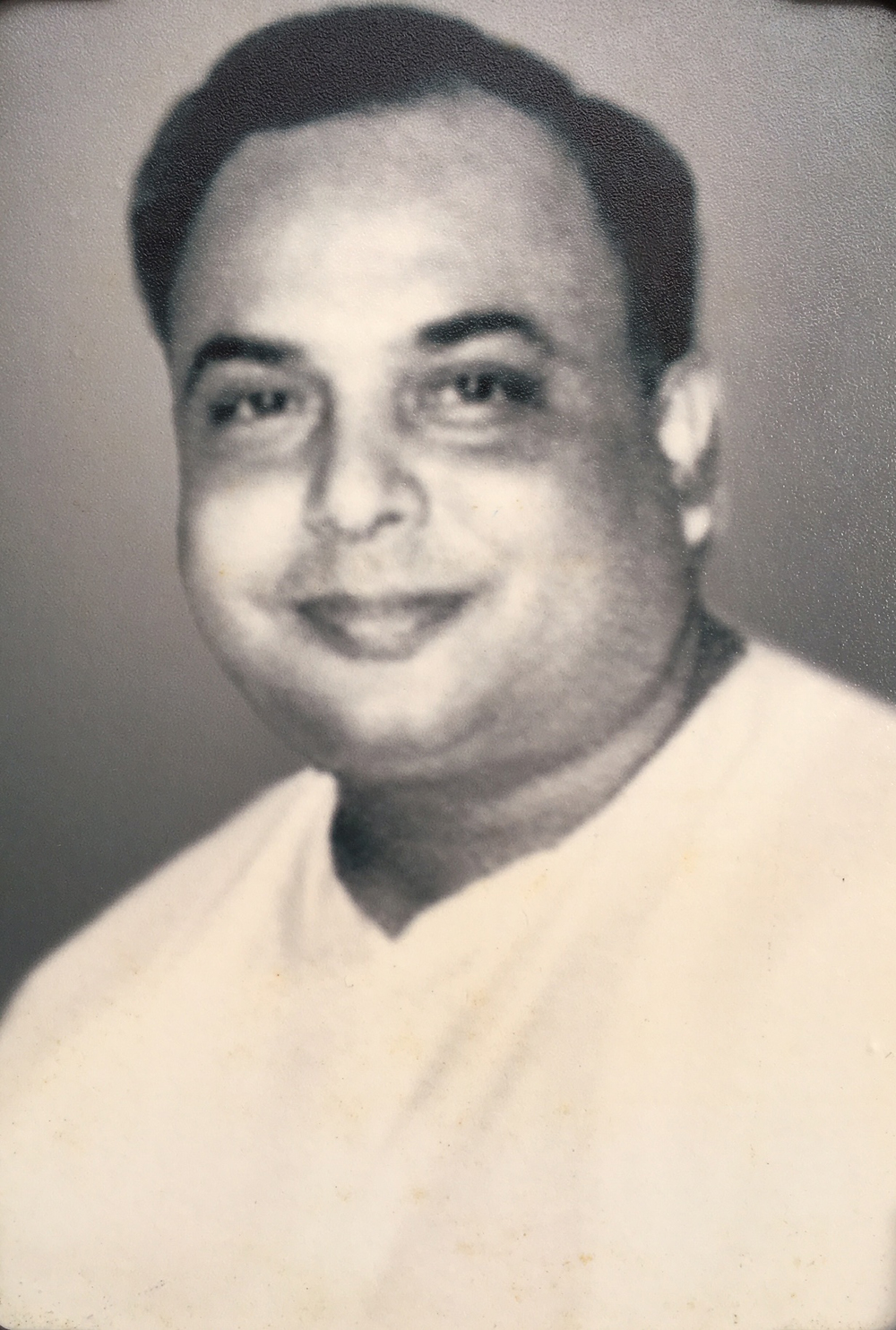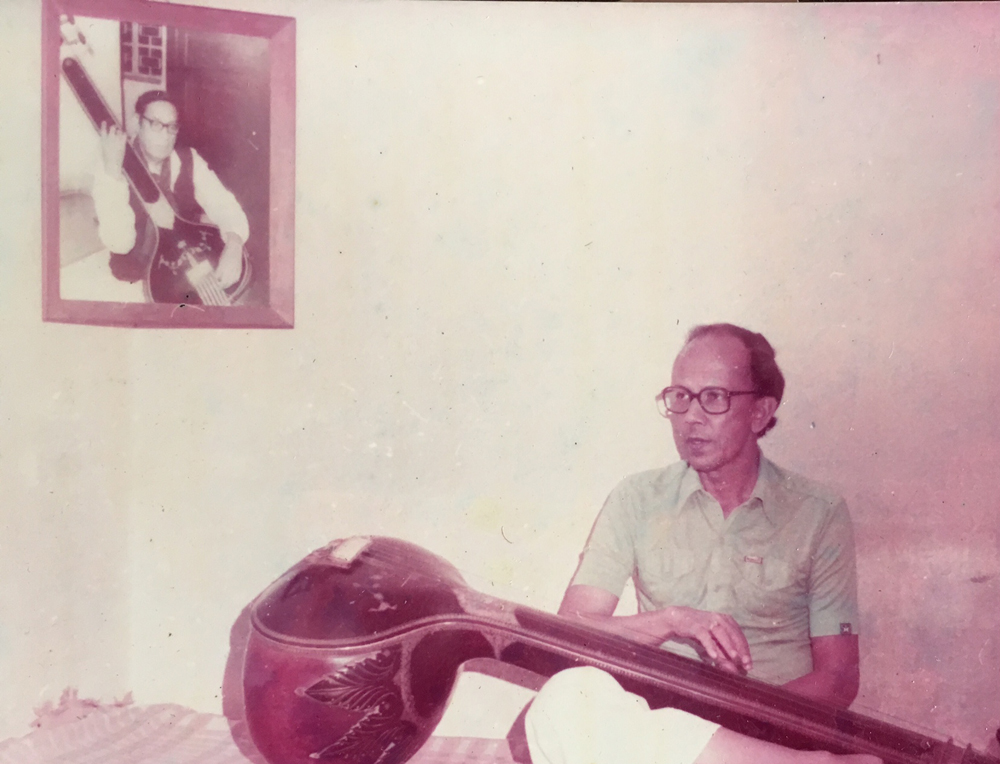Guru
' Naam Japale Re Guru Ke Charanana So
Guru Brahma Vishnu Shiva Sabhi Roop Dharo Re.'
Guru Brahma Vishnu Shiva Sabhi Roop Dharo Re.'
- Sangeeta Bandyopadhyay
Guru Sangeetacharya Chinmay Lahiri (1916 - 1984)

Pandit Chinmoy Lahiri is one of the most important architects, pillars and GURUs of the vocal music in India. A testimony to this fact is the emergence of some of the greatest vocalists of India taught and nurtured by him namely Gitasree Sandhya Mukerjee, Uma De, Parween Sultana, Sipra Bose to name a few. It is hard to find any singer from Bengal in that era who has not learnt from Pandit ji. Although he was primarily a disciple of Pandit Srikrishna Narayan Ratanjhankar of Lucknow Morris College of Music, he also received musical guidance from Dilip Bedi, Khurshid Ali Khan and Chhotey Khan.These training and knowledge helped him to develop a unique style which was easily distinguishable as a style of Pandit ji. Aesthetic representation of subtle yet intricate melodic compositions of Raga, effortless musical rendition of Taan and Sargam at lightning speed were the salient features of Pandit ji’s music.Obviously he created his own Gharana through classical compositions of established Ragas as well as new Ragas created by him like Kusumi Kalyan, Rajani Kalyan, Shyam Kauns, Gandharika, Pravati Todi, Ishani, Mangalbati amongst many. Needless to say that his genius was also utilised in Bengali films to produce several chart toppers of that era which are still sung today. His first disc came out in 1944 from the then Gramophone Company of India (presently HMV). The skills of music composer Pandit Chinmoy Lahiri were also put to use by Dhaka Radio, Kolkata Radio and Gramophone Company as well. We are very fortunate that not only did he propagate music through his teachings but he also have written down all his classical compositions in the book ‘Magan Geet O Taan Manjari’ which is published in four volumes. A point to be noted here is that any compositions which bears the name MAGAN is a composition created by Pandit Chinmoy Lahiri.
Guru Ustad Munawar Ali Khan (1930 - 1989)
Ustad Munawar Ali Khan, the worthy son of the great Ustad Bade Ghulam Ali Khan of Kausar-Patiala Gharana received his musical training from his illustrious father as well as uncle Ustad Barkat Ali Khan. Although groomed under the tremendous influence of the two doyens, Khansahib developed a style which was essentially deep-rooted to the Gharana with a remarkable flavour of his own. His style was marked by open and full throated voice, highly aesthetic treatment of Ragas and superb Taankari avoiding any unnecessary gimmickry. His biggest achievement was to stand out as a celebrated performer in-spite of singing together with the legendary vocalist like Ustad Bade Ghulam Ali Khan. Khansahib left a mark on Indian classical music scenario through his Bandishes of Khayal, Thumris and other semi classical genres. For example Raga Malini Basant is a wonderful creation from him. There are several audio discs to his credit. He has sang for Bengali Movie too. Khansahib has toured in Pakistan, Afghanistan, Europe and Australia extensively. His legacy is now being carried forward by his students who are highly accomplished and renowned vocalists of India, today.
Guru Pandit Kamal Bandyopadhyay (1932 - 2012)

Pandit Kamal Bandyopadhyay, a very well known vocalist of the fifties and sixties, was one of the senior most vocal exponents of Indore Gharana. Since 1953 he received rigorous TALEEM from the great Ustad Ameer Khan, and had been extremely fortunate to be amongst Ustadji’s closest associates till his demise. In fact he was considered almost as the shadow of Khansahib. In spite of being the most authoritative disciple of Ustadji, he had always shunned publicity. To him, life meant only his Ustad and everything else was secondary. He had accurately followed the footsteps of his Ustad’s philosophy of life as well as music. In return the Ustad has showered on him as much knowledge as was humanly possible for a maestro of His stature to His student. Panditji had completely shut himself off after his guru’s demise from the music world, silently propagating the great music to his disciples some of whom are big names in the classical vocal field of today.


